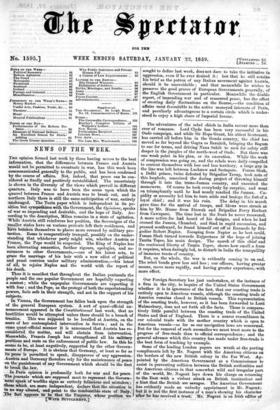NEWS OF THE WEEK. •
THE opinion formed last week by those having access to the best information, that the differences between France and Austria would not be permitted to eventuate in war, has this week been oommmunieated generally to the public, and has been confirmed by the course of affairs. Not, indeed, that peace can be con- sidered as finally and positively reestablished. The uncertainty is shown in the diversity of the views which prevail in different quarters. Italy was-to have been the scene upon which the quarrel between France and Austria was to break out, and in northern Italy there is still the same anticipation of war, entirely unchanged. The Turin paper which is independent in its po- sition but sympathizes with the Government, the Opinione, speaks of war as impending and desirable, and the hope of Italy. Ac- cording to the description, Milan remains in a state of agitation. While Austria still reinforces her position, the Sovereigns of the smaller states have on various pretexts left their residences, and have betaken themselves to places more covered by military pro- tection. Rome is comparatively tranquil, possibly on the under- standing that whichever party might win, whether Austria or France, the Pope would be respected. The King of Naples has been alternating amnesties, further rigours, apologies, and as- surances to other Governments,—one of his latest acts, to grace the marriage of his heir with a new edict of political and penal coercion under military administration,—his latest of all, to rejoice Naples and the world with the report of his death.
Thus it is manifest that throughout the Italian peninsula the people and the one popular Government are hopefully expecting a contest ; while the unpopular Governments are expecting it with fear ; and the Pope, as the protege of both the superintending powers, feels safe in their strength, and not in the support of his subjects.
In Vienna the Government has fallen back upon the strength of the general European system. A sort of quasi-official an- nouncement appeared in the Constitutionnei last week, that no hostilities would be attempted unless there should be a breach of treaties. This was iiiPposed to be levelled at Austria, on the soore of her contemplated intervention in Servia ; and in the same quasi-official manner it is announced that Austria has re- considered the matter, and will abstain from intervention. Meanwhile, Francis Joseph has strengthened all his military positions and rests on the enforcement of public law. In this he seems to be, at least negatively, supported by the other Govern- ments of Europe. It is obvious that Germany, at least so far as its press is permitted to speak, disapproves of any aggression. Austria and Germany therefore rely for the maintenance of peace on the punishment of any Government which should be the first to break the law.
In Paris opinion is professedly both for war and for peace.
The journals which are supposed most to represent the Govern- Inert speak of warlike signs as entirely fallacious and mistaken ; Ahem which are more independent, declare that the situation is in no way altered, and point to the combustible state of Italy. The fact appears to be that the Emperor, whose positive we sought to define last week, does not dare to take the initiative in aggression, even if he ever desired it ; but that he still retains his brief as the patron of any Italian movement against Austria, should it be unavoidable ; and that meanwhile he wishes to preserve the good graces of European Governments generally, of the English Government in particular. Meanwhile the double report, of impending war and of reassured peace, has the effect of creating daily fluctuations on the Bourse,—the condition of affairs most favouiable to the active moneyed interests of Paris, and peculiarly advantageous to a certain circle which is under- stood to enjoy a high share of Imperial favour.






























